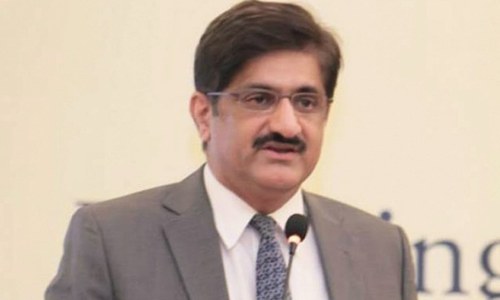ISLAMABAD: The Supreme Court on Tuesday asked the parties involved in a disqualification case against Chief Minister Sindh Murad Ali Shah to assist it in determining whether dual nationality entails ineligibility for life or for a temporary period.
A three-judge SC bench, headed by Justice Umar Ata Bandial and consisting of Justice Syed Mansoor Ali Shah and Justice Aminuddin Khan, had taken up a review petition moved to seek disqualification of the Sindh chief minister under Article 62(1)(f) of the Constitution for possessing dual nationality as well as having an iqama.
The court also asked the parties involved in the controversy to come prepared on the question whether a disqualified person could be allowed to contest elections if he furnished a certificate denouncing his foreign nationality.
The observation came when the counsel for petitioner Roshan Ali Baririo — a political rival of the Sindh chief minister — sought adjournment through an application file by Hamid Khan.
Asks whether dual nationality entails ineligibility for life or for a specified period
The Supreme Court had on Nov 6, 2019 by a majority of two to one issued a notice to Murad Ali Shah on the review petition. On Jan 23 that year, an SC bench, also headed by Justice Bandial, had rejected a petition of the same petitioner on the grounds that the political rivals should seek remedy from appropriate forums and also questioned the April 6, 2013 order of the returning officer that had disqualified Mr Shah under Article 62(1)(f) of the Constitution by stating that the RO was not a court of law.
Justice Bandial, who had authored the verdict, also noted that Mr Shah had applied for renouncing his citizenship on Sept 29, 2012 and got a certificate from the Canadian authorities about cancellation of his citizenship on July 18, 2013.
The judgement had noted that the RO in his order did not mention any finding in terms of wrongdoings and, therefore, his order was ineffective to impose a disqualification under Article 62(1)(f). Justice Bandial had rejected the plea with an observation that the chief minister did not suffer from a lifetime bar under Article 62(1)(f) and, therefore, he was eligible to contest the 2018 general elections.
But Justice Yahya Afridi, who was then a member of the three-judge bench, dissented from the majority judgement and posed a number of constitutional questions that needed to be addressed.
The questions Justice Afridi had raised were whether the disqualification of a private respondent (Murad Ali Shah) under Article 62(1)(f) was passed by a court of law or otherwise; whether his disqualification, if any, would be permanent in nature in terms of the test laid down in one of the earlier judgements of the apex court in the Samiullah Baloch case; whether the lack of bona fide on part of the petitioner in invoking the constitutional jurisdiction of the high court under Article 199 of the Constitution and having an alternative remedy under the election laws rendered the petition maintainable or otherwise; and whether the disqualification of the private respondent could be ignored by this court keeping in view the dicta laid down in the cases of Sher Alam Khan and Raja Shoukat Aziz Bhatti.
Moved through senior counsel Muhammad Waqar Rana, though argued by senior counsel Hamid Khan, Roshan Ali Baririo in his review petition requested the apex court to set aside the Jan 23, 2019 order since it contained errors of law and facts apparent on the face of the record, which had crept into the impugned order resulting in serious miscarriage of justice.
“Thus the Jan 23 is liable to be reviewed in the interest of justice, especially when one of the members of the bench had held that it was a fit case for the grant of leave against the July 20, 2018 order of the Sindh High Court,” the review petition argued.
The petitioner asked whether a judge of the high court, while acting as a member of the election tribunal and having passed an order which was substantially relevant in the subsequent proceedings and after having appointed as a judge of the Supreme Court, could rely upon and interpret his own earlier order in a way that would nullify an earlier judgment of the Supreme Court.
“When there is a difference of opinion on the matter of grant of leave to appeal amongst the judges of a full bench, whether it would have been just and proper to grant leave to appeal in the interest of justice,” the petition pleaded.
The review petition also highlighted that when the Supreme Court had upheld the order of the RO in a case after noticing grounds of disqualification under Article 62(1)(f) of the Constitution, whether the same could be replaced with another order of the Supreme Court.
Published in Dawn, January 19th, 2022














































